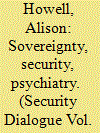| Srl | Item |
| 1 |
ID:
178340


|
|
|
|
|
| Summary/Abstract |
In the past decade, food security and nutrition practices have become central in the promotion of resilience in protracted crises. Such approaches have been welcomed by the aid community because of their potential for linking relief and development. Social and political analysts, however, have criticized resilience approaches for failing to consider power relations and because they entail an acceptance of crisis or repeated risk. In this context, regimes of food security and nutrition practices have become increasingly targeted, privatized and medicalized, focussing on individual behaviour and responsibility rather than responsibility of the state or international actors. This article uses examples from Sudan to examine how and why the resilience ‘regime of practices’ has functioned as a form of neoliberal governmentality, and argues that it has created a fantasy in which conflict in Darfur is invisible. This allowed food aid to be withdrawn and removed the need for protection despite ongoing conflict and threats to livelihoods; thus crisis-affected populations have been abandoned.
|
|
|
|
|
|
|
|
|
|
|
|
|
|
|
|
| 2 |
ID:
099565


|
|
|
|
|
| Publication |
2010.
|
| Summary/Abstract |
This article examines how psychiatry has been used as a technology of security in post-'liberation' Iraq. Drawing on Foucault and Foucauldian work on the history and sociology of medicine, it begins by tracing how, from the 19th century onwards, psychiatry has instantiated its authority through a claim to provide social security within national spaces, both through methods of sovereign confinement and through liberation and governance. Arguing that the various 'psy' disciplines - and medicine more generally - are increasingly used as technologies of security internationally, the article examines psychiatric practice in Iraq, where patients in the Al Rashad psychiatric institution were accidentally liberated from their confinement by US Marines in 2003. Iraq's 'mentally ill' were initially considered a manageable security threat and thus subject to liberal community governance efforts. Yet, after the so-called suicide bombing of two pet markets in 2008, reportedly by former Al Rashad patients, those deemed 'mentally ill' and others associated with them were once again made subject to sovereign confinement, marking a failure in liberal governance. Thus, this article seeks to explore some of the complex lines connecting sovereignty,
|
|
|
|
|
|
|
|
|
|
|
|
|
|
|
|